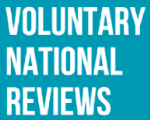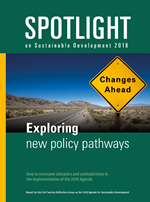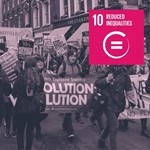Social Watch News
Published on Fri, 2018-07-13 00:00
The experience of Voluntary National Reviews and of Civil Society shadow (or spotlight) reporting. How it is key for meaningful participation and accountability The national voluntary reporting to the High Level Political Forum of ECOSOC is a practice that has gained traction, as dozens of governments are volunteering each year to participate and contribute their VNRs. A number of CSOs have prepared their own shadow or spotlight reports to follow-up on their governments efforts to implement the 2030-Agenda. Rising inequalities and the need to substantially change policies to achieve the SDGs is a common theme in many of them. Is there a meaningful dialogue between the official and the alternative reports? What is the value of the whole exercise. |
Published on Fri, 2018-07-13 00:00
The High-level Political Forum, United Nations central platform for follow-up and review of the 2030 Agenda for Sustainable Development and the Sustainable Development Goals. You will find here the information of Social Watch participation in the framework of the HLPF 2018. |
|
Source: . Published on Fri, 2018-07-13 00:00
The side event "SDG Implementation at National Level: What’s the Point of National Reports?" focused on voluntary national reports (VNRs) and parallel “shadow” or “spotlight” reports generated by civil society organizations (CSOs) on progress towards attaining the Sustainable Development Goals (SDGs). Moderator Roberto Bissio, Social Watch, asked presenters to address whether the shadow reports lead to changes and what can be learned from each other’s experiences. |
Published on Thu, 2018-07-12 11:47
Exploring new policy pathways: How to overcome obstacles and contradictions in the implementation of the 2030 Agenda Jointly organized by Arab NGO Network for Development, Center for Economic and Social Rights, Development Alternatives with Women for a New Era, Public Services International, Global Policy Forum, Society for International Development, Social Watch, Third World Network with support from Friedrich-Ebert-Stiftung. The world is off-track in terms of achieving sustainable development. Fundamental policy changes are necessary to unleash the transformative potential of the SDGs. In particular, there is a need for more coherent fiscal and regulatory policies and a whole-of-government approach towards sustainability. |
Published on Thu, 2018-07-12 11:47
The private sector plays a significant role in achieving the SDGs of the 2030 Agenda for Sustainable Development. Several corporations have already pledged their support for the SDGs or evaluated the relevance of SDGs in their business activities. The UN Global Compact has started a global campaign to celebrate business leaders who are taking action to advance the 2030 Agenda. In many countries, engaging the private sector in SDG implementation is part of official policy. Governments and the UN are seeking increased commitment from the private sector in order to finance SDG implementation and bring growth to their economies. Many governments expect the involvement of companies in SDG implementation to lead to greater social and environmental awareness in business strategies. |
Published on Wed, 2018-07-11 14:20
HLPF Side Event – Wednesday, July 11, 18:30-20:00 – UNHQ CR4 |
Published on Wed, 2018-07-11 09:18
The UK Government committed to reducing inequalities through Sustainable Development Goal 10. Three years later things aren’t on track but is the socio-economic duty the solution we need? Koldo Casla from Just Fair explains. By signing up to the Sustainable Development Goals (SDGs) in 2015, among other things, the UK Government committed to reducing inequalities. The SDGs, with their 17 Goals and 169 Targets, set the world on a trajectory where we have eradicated poverty, reduced inequalities, halted the loss of biodiversity and combatted catastrophic climate change. Some call them an action plan for the world. But as our chapter on SDG 10 in Measuring up shows, three years later the UK’s chances of hitting the targets on reducing inequalities by 2030 are not looking too good. |
| Published on Mon, 2018-07-09 11:01 |
Published on Mon, 2018-07-09 08:18
Global civil society report assesses obstacles and contradictions in the implementation of the 2030 Agenda |
Published on Sat, 2018-07-07 21:18
As key instruments to assess implementation of the 2030 Agenda, the UN secretariat has published The Sustainable Development Goals Report 2018 and a report on Progress Towards Sustainable Development Goals that should inform the ministers attending the High Level Political Forum of ECOSOC to be held mid-July in New York. Both publications aim to “provide a global overview of the current situation” of the SDGs, “based on the latest available data for indicators in the global indicator framework” and they include the same set of numbers and indicators, only differing in their presentation, the latter being more wordy and text-only and the former a collection of bullet points with ample use of graphs. |
SUSCRIBE TO OUR NEWSLETTER










